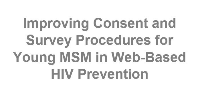Randomised controlled trial of incentives to improve online survey completion among internet-using men who have sex with men.
BACKGROUND:
HIV prevention research often involves the use of online surveys as data collection instruments. Incomplete responses to these surveys can introduce bias. We aimed to develop and assess innovative methods to incentivise respondents to complete surveys.
METHODS:
Adult men who have sex with men (MSM) living in the USA were recruited through banner advertisements on Facebook from 27 April 2015 to 6 May 2015 to participate in an online survey about HIV prevention and risk behaviours. Participants were randomised to one of four conditions: a monetary incentive; a series of altruistic messages highlighting the importance of participating in research; access to a dashboard comparing their responses with statistics from other participants after completion; and no incentive. Kaplan-Meier survival methods and univariate Cox proportional hazard models were used to evaluate survey dropout by incentive group and demographic variables of interest.
RESULTS:
There were a total of 1178 participants randomised to the four treatment groups. The rate of survey dropout among participants in the altruistic (HR=0.68, 95% CI 0.49 to 0.93), monetary (HR=0.44, 95% CI 0.32 to 0.61) and dashboard (HR=0.78, 95% CI 0.58 to 1.06) groups was lower than the non-incentivised control group. Regardless of condition, survey dropout was also lower among MSM aged 28-34 (HR=0.67, 95% CI 0.50 to 0.90) compared with those aged 18-22 years old, and MSM who were white (HR=0.78, 95% CI 0.60 to 1.02) compared with non-white participants.
CONCLUSION:
Monetary incentives and altruistic messaging can improve survey completion in online behavioural HIV prevention research among MSM.

